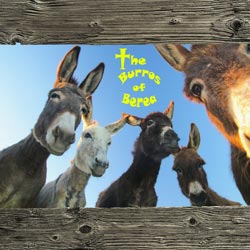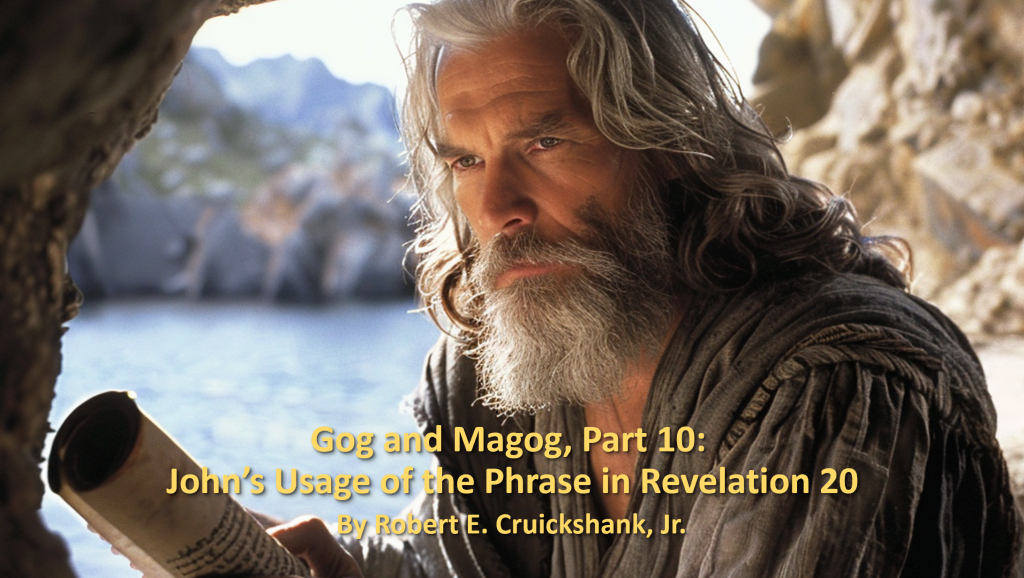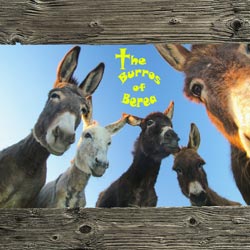Gog and Magog, Part 10: John’s Usage of the Phrase in Revelation 20
Copyright © Robert E. Cruickshank, Jr. (April 5, 2024)
All Rights Reserved
Eric Ogea (Editor)
“When the thousand years are completed, Satan will be released from his prison and will come out to deceive the nations which are at the four corners of the earth, Gog and Magog, to gather them together for the war; the number of them is like the sand of the seashore. And they came up on the broad plain of the earth and surrounded the camp of the saints and the beloved city, and fire came down from heaven and devoured them” (Rev. 20:7-9).
Up to this point, we’ve seen that all the key elements of Ezekiel’s prophecy constantly and continually take us to the book of Esther to find their fulfillment. In the above passage, John picks up on the Gog & Magog theme in the book of Revelation. As Mike Sullivan says, “John is using the symbolism of a past battle of Gog and Magog within Israel’s history to depict a future (but “shortly,” “at hand,” “soon,” and “about to be”) persecution and battle for John and his contemporaries to experience and relate to.”[1]
John does this several other times in Revelation, as well. He takes the reader’s mind back to a particular Old Testament time, place, or event in order to recall the circumstances and themes surrounding those times, places, or events. For example, the Church at Thyatira is told:
“But I have this against you, that you tolerate the woman Jezebel, who calls herself a prophetess, and she teaches and leads My bond-servants astray so that they commit sexual immorality and eat things sacrificed to idols” (Rev. 2:20).
John obviously didn’t mean that this was the same Jezebel whom we find in the Old Testament. It simply means that some of the Christians in John’s day were being led astray, in the same manner, that Jezebel had led God’s People astray in former times. John does the same thing with other Old Testament terms like Egypt (Rev. 11:8), Sodom (Rev. 11:8), and Babylon (Rev. 14:8; 16:19; 17:5; 18:2; 10, 21). He repurposes these images and applies them to the new situation that he’s writing about.
In other words, the situations are similar but not identical. He’s taking the core theme or idea behind the Old Testament situation and relating it to his contemporary situation. The usage of the Old Testament terminology adds an additional element to what he has to say to his readers to enhance his message. And his message wouldn’t be quite complete without it. So, the Gog and Magog motif serves to enhance and complete his message in Revelation 20.
Accordingly, one scholar says, “the crucial question” regarding John’s reuse of the phrase “Gog and Magog” in Revelation 20 is: “What would have been lost to John, to his original readers, and to us if this apposition had not been included?”[2] In other words, what difference would it make if you took those three words, “Gog and Magog,” out of the text of Revelation 20? Why, specifically, is this phrase there? What additional element does it add to what John is communicating that wouldn’t have been there otherwise?
In light of what was going on in the first century at the time, the additional element is crystal clear: it’s the plot twist. When we understand that Ezekiel 38-39 is fulfilled in the Book of Esther, and Revelation 20 is fulfilled in AD 70, it all comes together and makes perfect sense.
What’s going on in the book of Esther? The enemy of God’s People (Haman and his cohorts) is in league with the political power of the day (Persia). Haman conspires with the Persian king to exterminate the Jews. In the end, it backfires, and Persia turns on Haman. The deceiver is deceived. The executioner is executed. And God’s People are victorious.
What’s going on in the book of Revelation? What’s going on in the first century? What were his readers experiencing?
The enemy of God’s People (apostate Judaism) is in league with the political power of the day (Rome). The Jews and the Romans conspire together to exterminate the Christians. When John wrote, the Neronic persecution was in full swing, and the Christians were being wiped out. But what happens in the end? The beast (Rome) turns on the harlot (Jerusalem), and the True Israel of God (Jews and Gentiles alike who put their faith in Jesus Christ) is revealed.
Believers were being hunted down, persecuted, and killed. When John uses the phrase “Gog and Magog,” he lets his readers know that the tables are about to turn – just like they did in Esther’s day. And just like Mordecai’s three words, “I’m a Jew,” were loaded with meaning. John’s three words, “Gog and Magog,” are loaded with meaning as well.
But this is only the case when we understand Ezekiel’s Gog and Magog prophecy in light of its historical fulfillment in the book of Esther. Otherwise, those three words have no meaning. But with the backdrop of the battle in Esther, those three words have all the meaning in the world.
And just because Ezekiel’s prophecy was fulfilled in the past, as well as John’s, doesn’t mean their words have no meaning for us today. God’s Word is not dead and stagnant; it’s living and active (Heb. 4:12). It comes to life and speaks to every generation and every new situation. Just like Shadrach, Meshach, and Abednego stood their ground in the fields of Babylon and Mordecai in the streets of Persia and the first-century believers in the colosseums of Rome, we are called to stand for the Lord today – against all opposition.
Paul says: “having done everything to stand firm…stand firm” (Eph. 6:12-13). We take every thought captive to the obedience of Christ and destroy every argument and lofty opinion raised against the knowledge of God (2 Cor. 10:5). That’s another way of saying: we apply the Bible to every area of life. Like those who went before, we turn our backs on the gods of men. We don’t bow down to them, and we don’t bow to their idols. When the Lord’s people are faithful to Him, the Lord is faithful to His People. We need to stand for our God and the truth of His word, against all opposition, just like those who went before.
And that would be the main takeaway in all of this for us today.
________________________________________________________
[1]https://michaelsullivan.substack.com/p/russia-is-not-the-fulfillment-of/comments?fbclid=IwAR3aWre66RPpHGIQmL7UKgsKMimA1fIKFGm8k9RdNkVbFc_5Wi8bOjWzvCw
[2] Severre Boe, Gog and Magog: Ezekiel 38-39 as Pre-text for Revelation 19, 17-21, and 20, 7-10 (Germany: Mohr Siebeck, 2001), p. 4.



